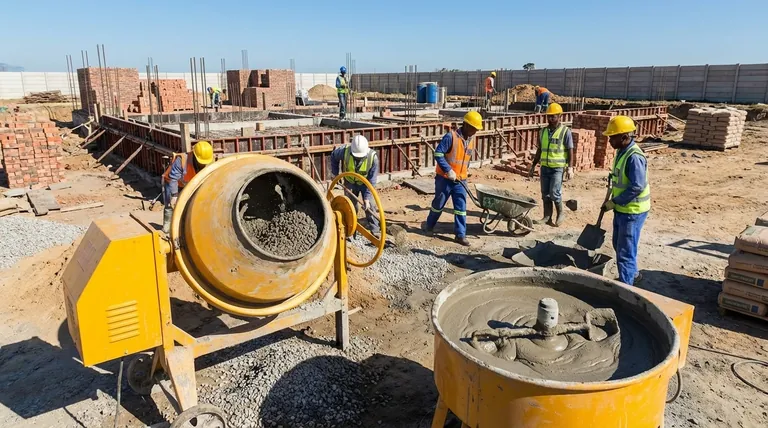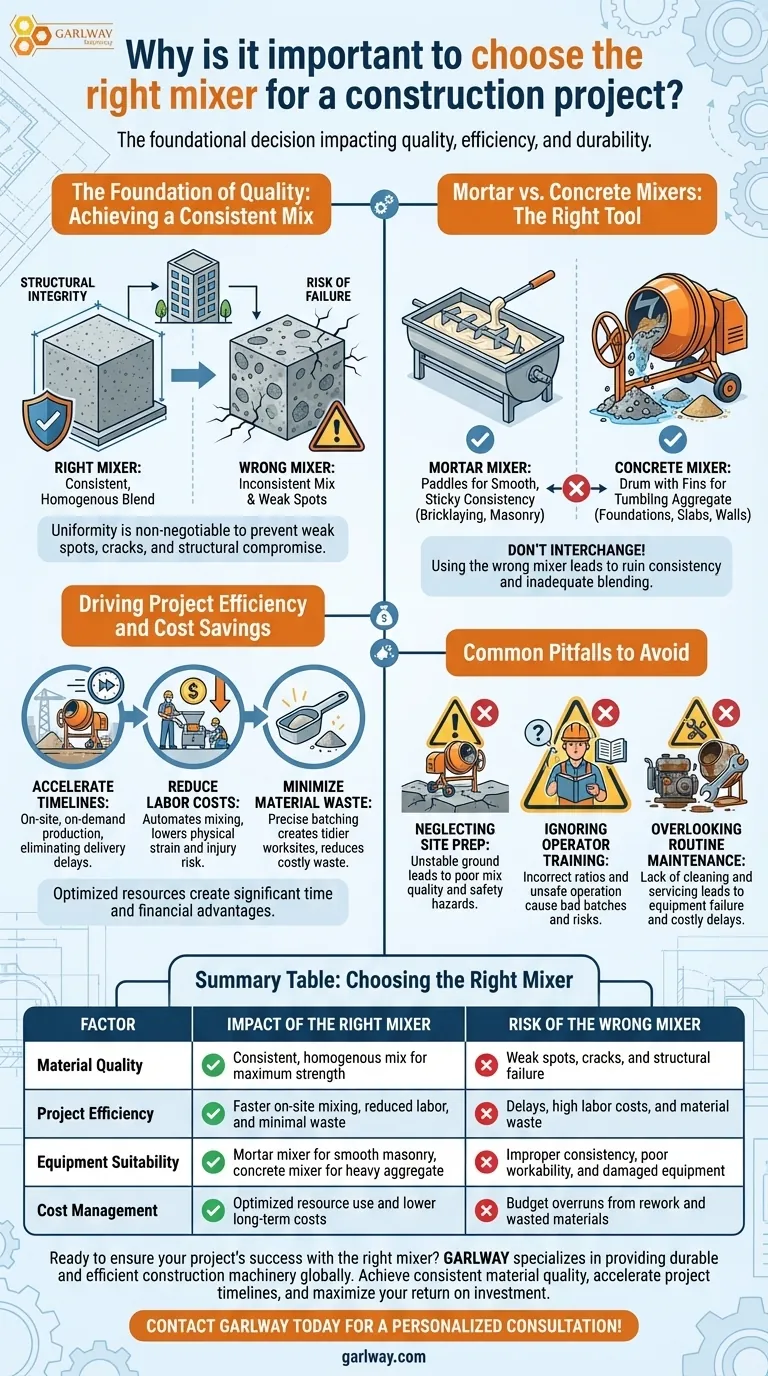Choosing the right mixer for a construction project is a foundational decision that directly impacts the quality of your materials, the efficiency of your timeline, and the long-term durability of the final structure. Using a mixer designed for the specific material, such as mortar or concrete, ensures a consistent, high-quality blend that manual mixing simply cannot replicate.
The selection of a construction mixer is not merely about convenience; it is a critical choice that governs the structural integrity of your work, the efficiency of your labor, and the overall financial viability of your project.

The Foundation of Quality: Achieving a Consistent Mix
The primary purpose of a mixer is to produce a homogenous blend of materials. The quality of this blend is the single most important factor in the strength and longevity of the concrete or mortar.
Why Uniformity is Non-Negotiable
An inconsistent mix can lead to weak spots, pockets of unmixed aggregate, and an improper water-to-cement ratio. These flaws compromise the structural integrity of foundations, slabs, and walls, creating a risk of cracks and failure over time.
Mortar vs. Concrete Mixers: The Right Tool
It's crucial to understand that not all mixers are the same. Mortar mixers are designed with paddles that gently fold and shear materials to create the smooth, sticky consistency needed for bricklaying and masonry.
In contrast, concrete mixers use a rotating drum with fins to tumble and combine cement, sand, aggregate, and water. Using a concrete mixer for mortar can ruin its consistency, and using a mortar mixer for concrete will fail to properly blend the heavy aggregate.
Driving Project Efficiency and Cost Savings
Beyond quality, the correct mixer is a powerful tool for optimizing your project's resources, saving both time and money.
Accelerating Timelines with On-Site Mixing
A dedicated mixer allows for the continuous, on-demand production of fresh material directly at the worksite. This eliminates delays associated with waiting for ready-mix deliveries or the slow, exhausting process of manual mixing.
Reducing Labor Costs and Physical Strain
Manually mixing concrete or mortar is an intensely physical and time-consuming task. A machine automates this process, significantly reducing the human capital required and lowering the risk of worksite injuries associated with repetitive strain.
Minimizing Material Waste
On-site machine mixing allows for precise batching, ensuring you produce only what you need. This precision helps create a tidier, more organized worksite and significantly reduces the costly waste of cement and other materials.
Common Pitfalls to Avoid
Choosing the right mixer is only the first step. To truly capitalize on its benefits, you must also avoid common operational errors that can undermine your project.
Neglecting Proper Site Preparation
A mixer must be placed on firm, level ground. An unstable machine is a safety hazard and can operate inefficiently, leading to a poor-quality mix. Always plan the location of your mixing station for stability and easy access.
Ignoring Operator Training
Simply having a machine is not enough. Operators must be trained on the correct water-to-mix ratios, proper loading sequence, and safe operating procedures. An untrained operator can easily produce a bad batch or create a safety risk.
Overlooking Routine Maintenance
Like any piece of heavy equipment, a mixer requires regular servicing. Neglecting to clean the drum after use or service the engine can lead to equipment failure, causing costly project delays.
Making the Right Choice for Your Project
Your project's specific needs should dictate your choice of equipment and your operational plan.
- If your primary focus is masonry or plastering: Choose a dedicated mortar mixer to achieve the smooth, workable consistency required for bonding bricks and blocks.
- If your primary focus is structural work like foundations or slabs: A robust drum-style concrete mixer is essential for properly combining heavy aggregate and ensuring maximum strength.
- If your primary focus is overall project efficiency: Invest in proper site planning, calculate your daily material needs, and ensure all operators are fully trained on safety and quality control.
Ultimately, viewing your mixer as a critical piece of quality assurance equipment is the key to a successful and durable build.
Summary Table:
| Factor | Impact of the Right Mixer | Risk of the Wrong Mixer |
|---|---|---|
| Material Quality | Consistent, homogenous mix for maximum strength. | Weak spots, cracks, and structural failure. |
| Project Efficiency | Faster on-site mixing, reduced labor, and minimal waste. | Delays, high labor costs, and material waste. |
| Equipment Suitability | Mortar mixer for smooth masonry; concrete mixer for heavy aggregate. | Improper consistency, poor workability, and damaged equipment. |
| Cost Management | Optimized resource use and lower long-term costs. | Budget overruns from rework and wasted materials. |
Ready to ensure your project's success with the right mixer?
GARLWAY specializes in providing durable and efficient construction machinery, including concrete mixers and mortar mixers, designed for construction companies and contractors globally. We help you achieve consistent material quality, accelerate project timelines, and maximize your return on investment.
Contact GARLWAY today for a personalized consultation and find the perfect mixer for your specific needs!
Visual Guide

Related Products
- Portable Electric Concrete Mixer Machine for Cement Mixing
- Ready Mixer Machine for Construction Ready Mix Machinery
- Portable Ready Mix Concrete Mixer Equipment
- Construction Products Concrete Plant Machine Mixing Concrete Mixer
- JW1000 Mobile Cement Mixer Concrete Mixer Truck and Batching Plant
People Also Ask
- How long does it take to mix concrete in a portable mixer? Master the 60-Minute Rule
- What is the use of a portable concrete mixer? Maximize On-Site Control & Efficiency
- What are the four main components of a portable concrete mixer? Build Better Concrete with the Right Mixer
- How much concrete can you mix in a portable mixer? Maximize Efficiency on Small Jobs
- How much concrete can you pour with a portable mixer? Find the Perfect Fit for Your Project



















